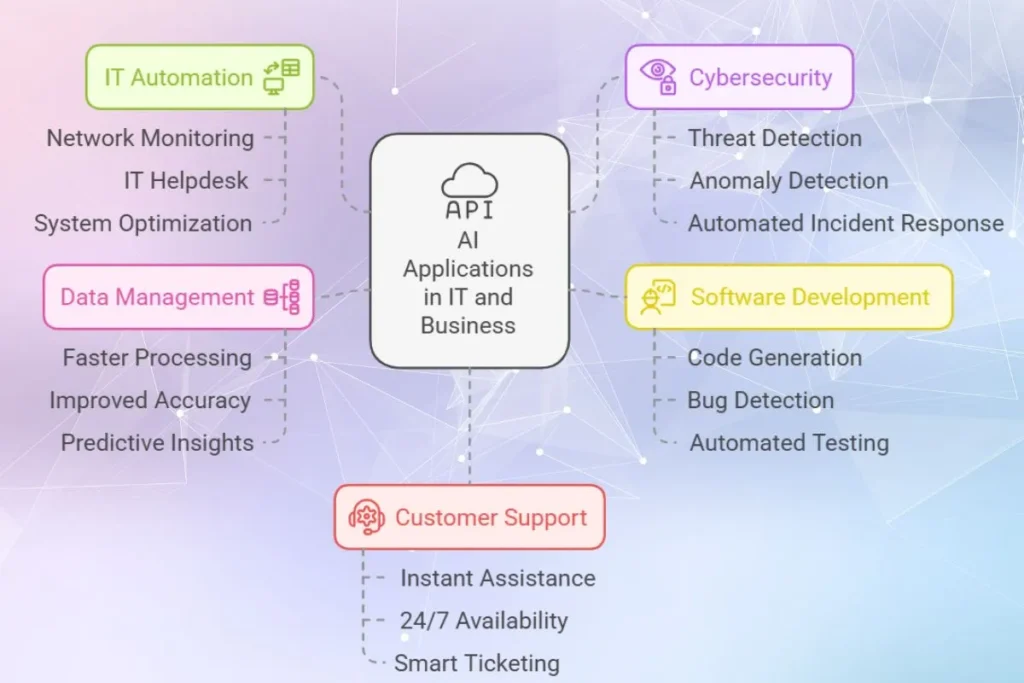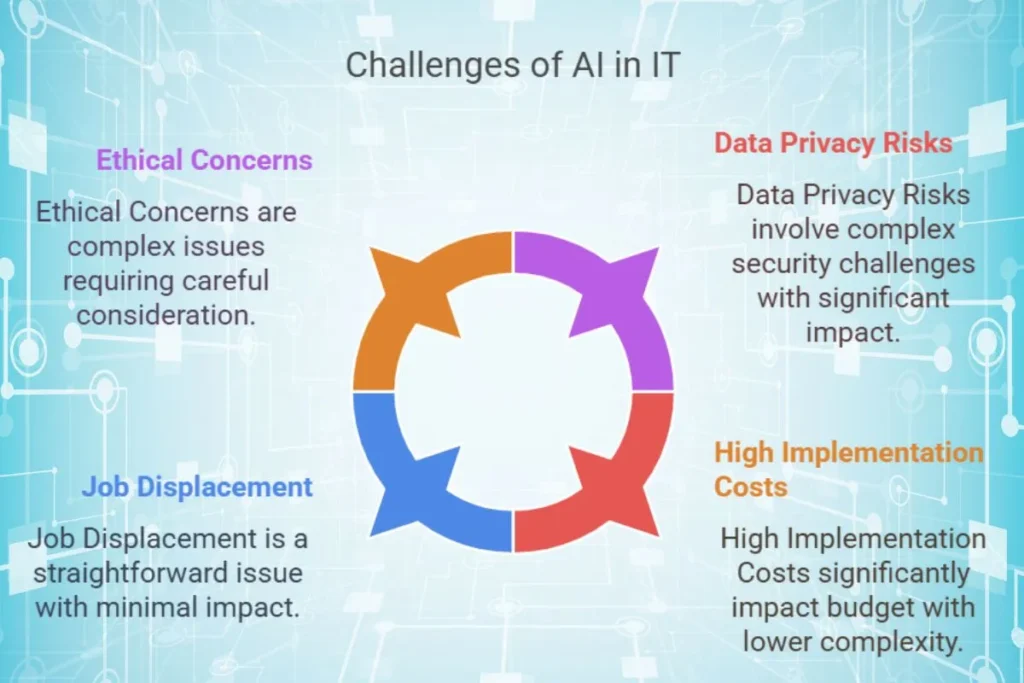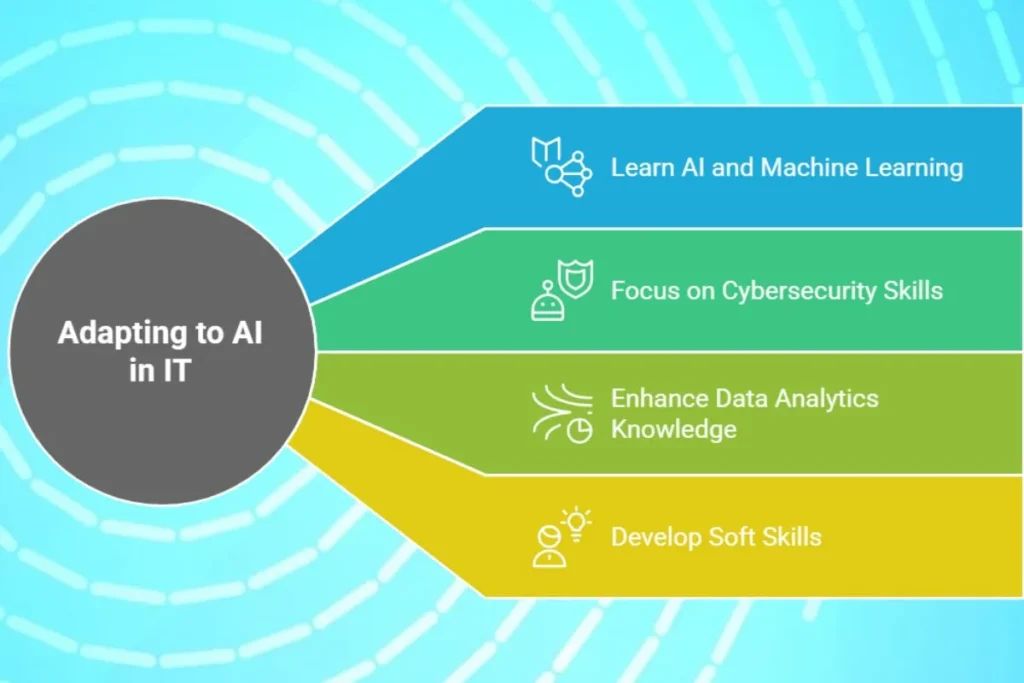Artificial intelligence (AI) is transforming the IT sector. It automates processes, strengthens cybersecurity, enhances software development and optimizes data management. AI driven solutions allow IT professionals to work faster and more efficiently. Companies use AI to boost productivity, reduce operational costs and improve decision making process.
In this blog article we shall learn about the role of artificial intelligence in IT sector. With AI in IT sector, IT systems can learn themselves, adapt and resolve issues with minimal human intervention.
Effect of Artificial Intelligence on IT Sector
AI is making a major impact on IT sector in many ways as mentioned below:
- Automating IT Operations – AI tools monitor system performance, detect anomalies and resolve issues before they become more problematic.
- Strengthening Cybersecurity – AI identifies threats, prevents cyberattacks and enhances incident response.
- Optimizing Software Development – AI assists in coding, debugging and testing, which reduces development time.
- Revolutionizing Data Management – AI enables faster, more accurate data analysis and decision making process.
- Enhancing IT Customer Support – AI chatbots and virtual assistants provide instant support and improve user experience.
1. AI in IT Automation
AI automates repetitive IT tasks, which allows professionals to focus on more complex problem solving tasks.
Examples:
- Network Monitoring: AI tools predict outages and detect network failures in real time.
- IT Helpdesk: AI powered virtual assistants handle common support requests, reducing human workload.
- System Optimization: AI analyzes system logs and recommends performance improvements.
Case Study:
Google employs AI to manage its data centers, which reduces power consumption by 40% and optimizes operations.
2. AI in Cybersecurity
Cyber threats are growing and AI plays a very important role in detecting and reducing security risks.
AI Security Features:
- Threat Detection: AI scans for malware, phishing attacks and other cyber threats.
- Anomaly Detection: AI identifies suspicious activity that may indicate a security breach.
- Automated Incident Response: AI takes immediate action to contain threats and prevent damage.
Example:
IBM’s Watson for Cyber Security uses AI to analyze large security datasets, to detect threats faster than human analysts.
3. AI in Software Development
AI is streamlining software development, which makes coding and testing more efficient.
AI Powered Tools:
- Code Generation: AI suggests and writes code snippets based on user input.
- Bug Detection: AI identifies errors and recommends solutions.
- Automated Testing: AI performs software tests and ensures functionality.
Example:
GitHub Copilot, an AI coding assistant, enhances developer productivity by offering real time code suggestions.
4. AI in Data Management
AI improves data collection, analysis and utilization, which helps businesses to make informed decisions.
Benefits of AI in Data Management:
- Faster Processing: AI analyzes massive datasets quickly.
- Improved Accuracy: AI minimizes human errors in data interpretation.
- Predictive Insights: AI identifies trends and patterns that guide business to make strategies.
Example:
Amazon uses AI powered analytics to provide personalized product recommendations and optimize inventory management.
5. AI in IT Customer Support
AI driven chatbots and virtual assistants are enhancing IT customer service.
AI in Customer Support:
- Instant Assistance: AI chatbots handle IT support inquiries in real time.
- 24/7 Availability: AI ensures round the clock technical support.
- Smart Ticketing: AI categorizes and prioritizes IT support tickets.
Example:
Microsoft’s AI powered virtual assistant helps users to troubleshoot issues, which reduces the workload on IT teams.

Challenges of Artificial Intelligence in IT
Although AI has many benefits, it also has to face several challenges mentioned below:
1. Data Privacy Risks
AI relies on large datasets, which increases concerns about security and privacy breaches.
2. Job Displacement
AI automates many IT tasks, which potentially reduces demand for certain roles.
3. High Implementation Costs
Adopting AI requires significant investment in infrastructure, training and maintenance.
4. Ethical Concerns
AI decision making can sometimes be biased, which may impact fairness and accountability.

How to Adapt to Artificial Intelligence in IT
IT professionals must prepare themselves for the changes due to adaptation of IT by acquiring new skills and staying updated on emerging technologies.
1. Learn AI and Machine Learning
Understanding AI algorithms and machine learning concepts can open new career opportunities.
2. Focus on Cybersecurity Skills
With AI driven threats on the rise, cybersecurity expertise is in high demand.
3. Enhance Data Analytics Knowledge
AI makes progress on data. Learning data analytics and visualization tools can help IT professionals to make better decisions.
4. Develop Soft Skills
Critical thinking, creativity and problem solving attitude remain valuable as AI continues to evolve.

Key Takeaways:
- AI automates IT processes, which makes operations faster and more efficient.
- AI strengthens cybersecurity by detecting and preventing threats in real time.
- AI accelerates software development, by improving code quality and testing.
- AI enhances data management, which enables faster and more accurate analysis.
- IT professionals must embrace AI technologies and upskill to stay relevant.
Conclusion
AI will continue to make progress in IT operations, cybersecurity and software development. Companies will invest in AI to enhance efficiency and security. IT professionals who adapt to AI trends will remain competitive in the job market.
As AI progresses, it will become an important part of IT, which shall drive innovation and optimize business operations.


Thank you I have just been searching for information approximately this topic for a while and yours is the best I have found out so far However what in regards to the bottom line Are you certain concerning the supply